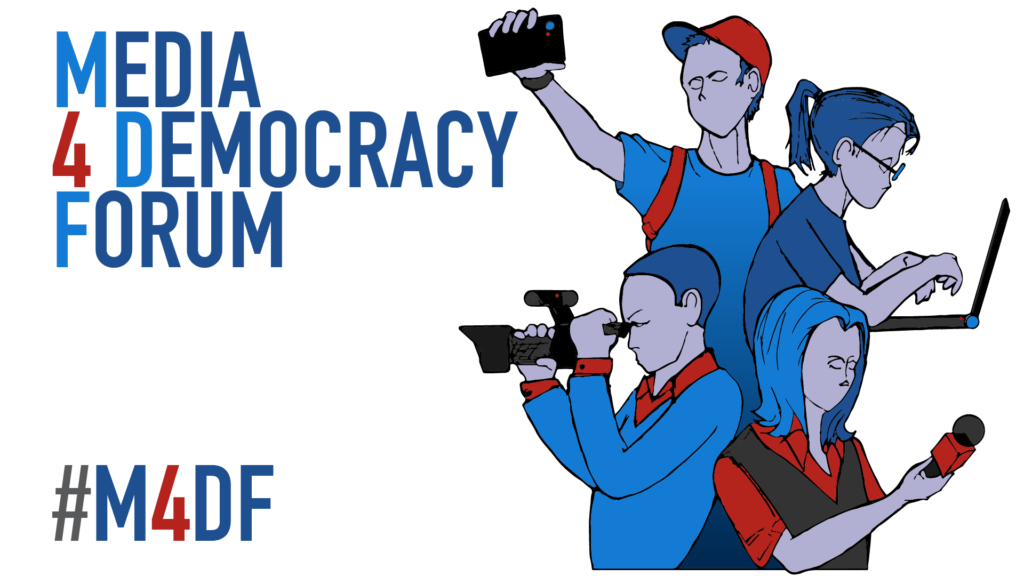
This year’s World Press Freedom Day focuses on ‘journalism and elections in times of disinformation’, Teresa Mioli writes for the Knight Center for Journalism in the Americas.
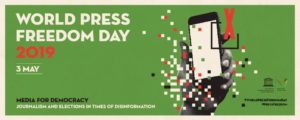 Western policymakers and academics find themselves in the midst of a debate on how to maintain the rights of a free press in a world increasingly flooded by disinformation, some of it sponsored and disseminated by state actors, Polygraph adds.
Western policymakers and academics find themselves in the midst of a debate on how to maintain the rights of a free press in a world increasingly flooded by disinformation, some of it sponsored and disseminated by state actors, Polygraph adds.
“As we learned during the Cold War, we need not become them to fight them,” wrote retired U.S. Ambassador Daniel Fried and Brookings fellow, Dr. Alina Polyakova in an Atlantic Council report in 2018. “As an open system, democracy is more vulnerable in the short run to certain manipulation, but it is more resilient than authoritarian systems in the longer term,” the two scholars stated in their report, “Democratic Defense Against Disinformation.”
 Despite innovative tools and dedicated reporters, fighting false information can feel like an uphill battle. But as an international community dedicated to upholding free and fair elections, we must focus resources on giving real journalists – those who should be the first line of defence against false information – tools to preserve and expand their watchdog role, say Internews CEOs Jeanne Bourgault and Daniel Bruce:
Despite innovative tools and dedicated reporters, fighting false information can feel like an uphill battle. But as an international community dedicated to upholding free and fair elections, we must focus resources on giving real journalists – those who should be the first line of defence against false information – tools to preserve and expand their watchdog role, say Internews CEOs Jeanne Bourgault and Daniel Bruce:
In India and Indonesia, through a partnership with Google News Initiative and multiple local organizations, a fact-checking initiative trained more than 7,000 journalists and journalism students, conducted boot camps in multiple local languages, and held more than 200 workshops in newsrooms, colleges, and press clubs across more than 60 cities last year.
Join the U.S. Agency for Global Media, media experts, practitioners, opinion leaders and policy makers for the Media for Democracy Forum #M4DF (above): a multi-session event designed for exchanging ideas and networking.
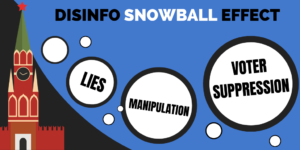
EU vs Disinfo
The mission of USAGM stands squarely in the intersection between democracy and the media, and relies upon utilizing technology to support both. USAGM is convening this forum to discuss how a free press and information technology can support democratic institutions throughout the world and prepare for the challenges facing democratic values and forms of governance. The forum aims to identify best practices and opportunities for collaboration across sectors, as well as forge ties among groups interested in leveraging technological developments to bolster access to unbiased information and support freedom and democracy.
Agenda
9:00 AM Welcome to the Forum
- Kenneth R. Weinstein, President and CEO of Hudson Institute
9:10 AM Opening Keynote: Why Media for Democracy, and Why Now?
- Alec Ross, Technology Policy Expert, Innovator and Author
9:45 AM New and Emerging Threats to Media Freedom: What’s Next?
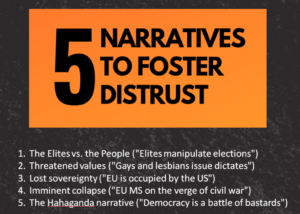 Technology and media have never before been more intertwined. Despite so much potential and promise for access to information, the number of countries where journalists can operate freely is declining and press freedom indexes are backsliding. This panel will explore what is happening to freedom of expression around the world and online, what it means for democracy and what we can do to reverse these trends.
Technology and media have never before been more intertwined. Despite so much potential and promise for access to information, the number of countries where journalists can operate freely is declining and press freedom indexes are backsliding. This panel will explore what is happening to freedom of expression around the world and online, what it means for democracy and what we can do to reverse these trends.
- Amanda Bennett, Director, Voice of America
- Libby Liu, President, Radio Free Asia
- Sarah Repucci, Senior Director for Research and Analysis, Freedom House
- Arturo Filastò, Founder, Open Observatory of Network Interference
- Chris Walker, Vice President, National Endowment for Democracy
- Moderator: Shawn Powers, Acting Chief Strategy Officer, U.S. Agency for Global Media
11:00 AM Coffee Break and Networking
11:15 AM Networks of Destruction: Disinformation and its Discontents
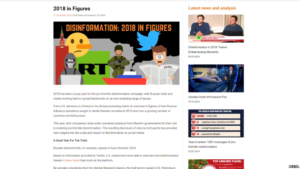
Polygraph
This panel will explore dis-, mis-, and mal-information and the ways propaganda works in the digital age. We will discuss strategies for transparent storytelling in the age of disinformation to show how institutions can build trust with audiences, which is crucial in an era where people question what they see and hear. The panelists will pay particular attention to the Kremlin’s efforts to distort the free internet space and the latest electoral campaign in Ukraine.
- Simon Ostrovsky, Journalist and Filmmaker, Coda Story
- Peter Pomerantsev, Author, ‘Nothing is True, and Everything is Possible’
- Natalia Sedletska, Author and Host, RFE/RL investigative TV show ‘Schemes’
- Moderator: Melinda Haring, Editor of UkraineAlert at The Atlantic Council
12:30 PM Lunchtime and Networking
1:15 PM Keynotes: Re-Engaging in the Information Battlefield
- John Lansing, Chief Executive Officer and Director, U.S. Agency for Global Media
- The Honorable Senator Ted Cruz (R-TX)
1:45 PM Machined Media: Artificial Intelligence and the Future of Journalism
Panelists from across government and the private sector will discuss how artificial intelligence (A.I.) and other advanced technologies can and will impact the future media landscape. Discussions will include the role of A.I. in making content smarter and more engaging, using machine learning and other techniques to craft and implement creative strategies to reach audiences, and the next generation of “deepfakes” and machine-generated content.
- Sameena Shah, Managing Director, Head of Data Science, S&P Global Ratings
- Shamir Allibhai ,CEO, Amber Video and Founder, Simon Says
- Mike Pritchard, White House Presidential Innovation Fellow
- Phil Anderson, Data Scientist, Department of State
- Nicole Martin, Contributor, Forbes and Owner, NR Digital Consulting
- Moderator: Makena Kelly, Policy reporter, The Verge
3:00 PM Coffee Break and Networking
3:15 PM Re-imagining Journalism: Storytelling for Civic Engagement
From Iran’s green revolution to the Arab Spring, media and technology are no longer simply used to cover social change; they are fundamentally intertwined with how events unfold. Emerging technologies and new forms of storytelling are fundamentally creating new pathways for civic engagement. As some foundational concepts are being re-assessed – what defines news, engagement, and meaningful user experience – this panel will discuss key trends in the industry and highlight how emerging media platforms can empower an informed and catalytic citizenry.
- Robert Hernandez, USC Annenberg School for Communication and Journalism
- Andreas Giefer, Coordinator, Deutsche Welle Lab
- Emma Lacey-Bordeaux, D.C. Editor, The Row at CNN
- Thaer Soukar, Director of Digital Content, Middle East Broadcasting Networks
4:30 PM Closing Remarks: Key Challenges and Next Steps
- Steve Capus, Former President, NBC News and Former Executive Editor and Producer, CBS News
- The Honorable Congressman Chris Stewart (R-UT)
May 7, 2019,
Registration 8:15 a.m. – 9:00 a.m.
Program 9:00 a.m. – 5:00 p.m.
The U.S. Institute of Peace
2301 Constitution Ave NW, Washington, DC 20037







